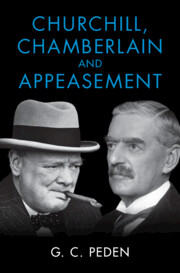‘A masterly analysis that takes a fresh approach to appeasement, based on the author's expert knowledge and understanding of both policies and personalities.'
Gill Bennett - Former FCO Chief Historian
‘A rigorous and compelling new look at one of the most important episodes in twentieth-century British and European History.'
Richard Toye - University of Exeter
'Chamberlain, the man with the umbrella, and Churchill, the man with the cigar, were both brand names by 1930 … Chamberlain’s dramatic flight to meet Hitler at Munich in September 1938 meant that the word ‘appeasement’ was associated with him as clearly as if it had been tattooed on his forehead. Churchill's opposition to the Munich Agreement was equally dramatic … But G. C. Peden suggests that the contract between the two was less black-and-white than it first appears.'
Richard Vinen
Source: Literary Review
‘This well-researched and scholarly book brings together Peden’s earlier specialities and publications with fresh perspectives and work … A book to enjoy as well as to consider.’
Jeremy Black
Source: Journal of European Studies
‘Peden’s book will be the definitive history of the Churchill-Chamberlain relationship for some time to come.’
Peter Neville
Source: Diplomacy & Statecraft
‘Peden’s contribution to the historiography is to juxtapose a close reading of the diplomatic sources with analysis of the structural strengths and weaknesses of the British economy as they related to rearmament. The result is not a revolutionary reinterpretation, but rather a more nuanced reading of what could realistically have been accomplished in the lead-up to September 1939 … Recommended.’
F. Krome
Source: Choice
‘Accessible and engaging.’
David M. Valladares
Source: History
‘[The book gives] a thorough and often convincing picture of what is known and alerts the reader to multiple differing viewpoints. A willingness to address counterfactuals - and where they may lead - makes this compelling history.’
David C. Isby
Source: strategypage.com



